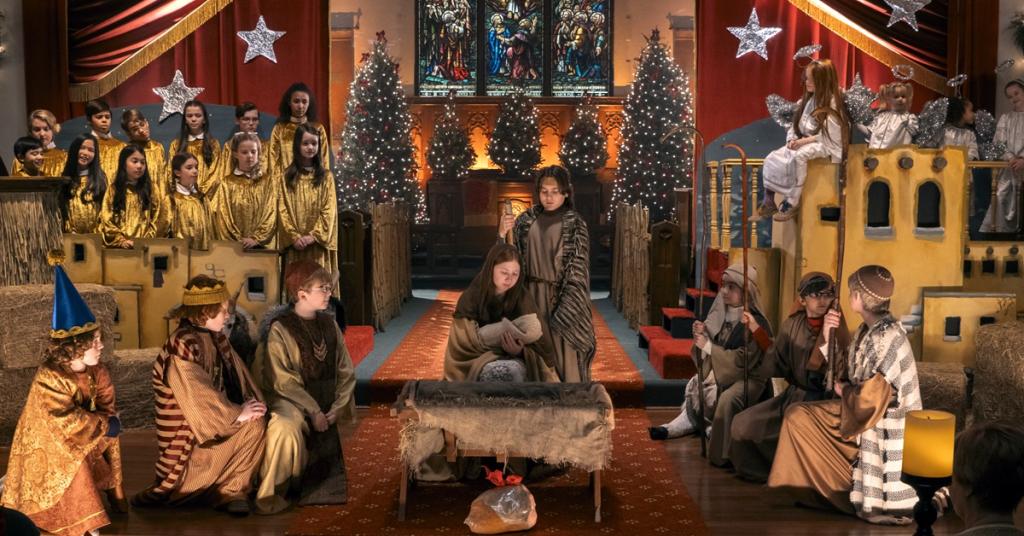We all know that there can be a wide disparity in the amount of attention Catholics and Protestants give to the Virgin Mary — which is one thing that makes The Best Christmas Pageant Ever quite interesting.
More on that in a bit.
What Is The Best Christmas Pageant Ever About?
Hitting theaters on Nov. 8 (after preview screenings the previous weekend), and based on a 1972 novel by Barbara Robinson, it comes from Kingdom Story Company, the faith-based division of Lionsgate, which is also the distributor.
Kingdom is behind several faith-based movies of the last few years — including Jesus Revolution, I Can Only Imagine and Ordinary Angels — and the Christian content in all of those has a distinctly Evangelical flavor, reflecting the backgrounds of company founders/filmmakers Andrew and Jon Erwin, and Kevin Downes.
Co-writer and director for The Best Christmas Pageant Ever is The Chosen creator Dallas Jenkins, also an Evangelical.
The story, set more or less in the ’70s-ish, centers on a Protestant church in the small town of Emmanuel (Hebrew for “God is with us”), which is about to celebrate the 75th anniversary of its annual Christmas pageant.
But when injury sidelines the woman who’s been running it like clockwork for many years, mom Grace (Judy Greer) volunteers to take over. This doesn’t set well with the congregation’s gaggle of snooty church ladies (including Elizabeth Tabish, who plays Mary Magdalene in The Chosen).
Things get worse when, through a series of circumstances, Grace allows the rowdy, raucous — but also neglected, hungry and shabby — Herdman siblings to take over most of the lead roles, including Mary, Joseph and the Angel of God.
The Herdmans are legendary in Emmanuel for their bad, sometimes criminal, behavior, and especially for bullying fellow students, such as Grace’s children, Beth (Molly Belle Wright) and Charlie (Sebastian Billingsley-Rodriguez).
But Grace’s husband, Bob (Pete Holmes), stands behind his wife, and, when things seem desperate, even offers a fresh perspective on the Herdmans.
Gilmore Girls star Lauren Graham narrates and makes an appearance.
The Story Is Famous to Many, But Not Everyone (Including Me)
Apparently, especially in Evangelical circles, this book (which was already a 1983 TV movie with M*A*S*H star Loretta Swit, and has had many stage adaptations) is widely known and beloved.
But, I’d never heard of it before Jenkins announced he was doing the film. So, when I sat down to watch, I had little to no preconceptions.
The Verdict?
It’s cute and charming, heartwarming without being cloying, with good performances from Greer, Holmes and young Wright.
Shot in wintry Winnipeg, it has a more authentic look than most Christmas movies (which are usually shot in the summer), and great attention was paid to the traditional look and feel.
It’s not the most flattering portrayal of a Christian congregation, although the minister, played by The Chosen star Kirk B.R. Woller, and his wife, are OK, if a bit ineffectual. In particular, the church’s leading women don’t come off well.
They’re bitterly and vocally opposed to the Herdmans having any part in the show, but seem utterly unconcerned that the six kids — ranging from around 11 to young enough to be missing front teeth — seem largely unparented, grubby and underfed.
Obviously, this sets up a revelation that they should exhibit more Christian charity — exemplified by Grace — but, dang. However, the portrayal is not without a grain of truth, and therein lies the sting.
The religious tone and message are present throughout, but, especially through the warmth of Greer’s and Holmes’ portrayals, don’t veer into the overly preachy.
Overall, it’s a fine film for family holiday viewing, and should spark conversations on what happened to be today’s (Nov. 3) Gospel reading at Mass, from Mark 12 (emphasis mine):
One of the scribes came to Jesus and asked him,
“Which is the first of all the commandments?”
Jesus replied, “The first is this:
Hear, O Israel!
The Lord our God is Lord alone!
You shall love the Lord your God with all your heart,
with all your soul,
with all your mind,
and with all your strength.
The second is this:
You shall love your neighbor as yourself.
There is no other commandment greater than these.”
But, as I said up top, the film is interesting — and here’s why.
The eldest Herdman, Imogene (a very effective Beatrice Schneider), who’s forced to essentially be mother to her younger siblings, keys into a painting of a Madonna and Child at the church.
To her, it’s the mother she doesn’t really have, and a way to unlock the softer parts of herself.
She puts her hand up for the role of Mary, and the realism she ultimately brings to the part is one of the film’s most touching moments.
After all, Jesus doesn’t have a lot to say for Himself in this particular Gospel story, and Joseph doesn’t have any lines at all in the Bible.
Also, when Luke sat down to write his Gospel, the only person left alive on Earth who would have been present at the Nativity was Mary. I’ve always suspected she was one of his top sources.
So, by circumstance or divine design, Mary is a central figure in the Nativity story (and the rest of Jesus’ life, but that’s another movie — or TV series).
Outside of the Catholic and Orthodox worlds, Mary too often fades from the picture after Jesus’ birth until reappearing at the foot of the Cross. But, here, seen through the eyes of a girl who never heard the Christmas story before, she becomes the iconic maternal figure, the one who, in essence and reality, brought God to us.
By the way, Vanessa Benevente, who plays Mary, the Mother of God, in The Chosen, also has a cameo role.
So, with actresses who play Mary Magdalene and the Virgin Mary, plus Imogene playing Mary, and the importance of the Madonna and Child image, it’s a very Mary Christmas.
Turns out Father Edward Looney agrees with me:
As a Roman Catholic, a priest, and a Marian theologian, I’ll tell you that the portrayal of Mary throughout was exquisite—for instance, when young Imogene Herdman wants to understand who Mary is, and feels unqualified to play her because she is not like her at all. The scenes of the young girl staring at a picture of Mary in the church were heartwarming and are etched forever in my memory. An Evangelical Protestant filmmaker captured the essence of Catholic Marian devotion, even if he did not intend to do so!
The Nativity Story Hits Differently Here
The Best Christmas Pageant Ever also reminds us of what it’s like to hear the Christmas story for the first time.
The Herdmans have a lot of questions, legitimate ones, that usually get forgotten or glossed over by those who have been soaked in the story from infancy.
I discussed a lot of this with Kevin Downes, a producer on the film, in the video interview below — in which I also confess to not being a big Santa Claus fan (the jolly old elf doesn’t make an appearance in this movie).
Downes discusses the challenges of shooting in subzero Winnipeg, what the story means to him and his family, occupying the (sadly, largely unpopulated) niche of Christmas movies that are both actually about Christmas and also fun, and whether there’ll be a ham on his Christmas table (IYKYK).
(By the way, by way of shameless self-promotion, I have a script of mine under option that also in that underserved niche. Call me or these folks if you want to know more.)
It’s a fun conversation with Downes, so I recommend listening to the whole thing.
Image: Essek Moore as Ollie Herdman, Ewan Wood as Leroy Herdman, Lorelei Olivia Mote as Alice, Matthew Lamb as Claude Herdman, Molly Wright as Beth, Beatrice Schneider as Imogene Herdman, Mason Nelligan as Ralph Herdman, Kynlee Heiman as Gladys Herdman, Sebastian Billingsley-Rodriguez as Charlie in Best Christmas Pageant Ever. Photo Credit: Allen Fraser
Don’t miss a thing: Subscribe to all that I write at Authory.com/KateOHare.














